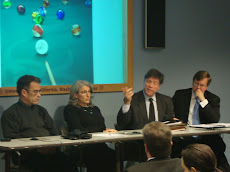In the U.S., a federal advisory panel said the FDA should move ahead to approve or license the new H1N1 vaccine without waiting to receive data from clinical trials to test its safety and efficacy. The government and vaccine makers plan to start human studies of the H1N1 vaccine in the U.S. in the coming weeks, but the first-look data from those studies won't be given to the FDA until September.From Gannett:
But the FDA told its scientific advisers it could finish the red tape of licensing much of that vaccine well before the use-it-or-not decision is made — because it's brewed exactly the same as regular winter flu vaccine, merely using the new swine influenza virus, part of the common H1N1 influenza family, as the chief ingredient. Companies just have to take the normal steps required for each year's regular winter flu vaccine, such as proving the inoculations are manufactured appropriately.
Taking the same path now will save some important time because "the virus is ahead of us," said FDA vaccine chief Dr. Norman Baylor. This "is not a rubber stamp. We do need to review some data to give us some comfort that that vaccine will provide some benefit and that it's manufactured properly."
... Make no mistake: Vaccines containing immune-system boosters called adjuvants are not candidates for the easier strain-change approval, the FDA said. Flu vaccine with this extra ingredient is widely sold in Europe but never has been sold here, and there's little information about their safety in young children or pregnant women. While both adjuvant-free and adjuvant-added swine flu vaccine is being tested in the U.S. and abroad, using it outside of those studies would require a completely separate government decision.
FDA appears unwilling, currently, to take the bigger risk of approving novel adjuvants, which have not been tested in at-risk populations, without data. But the risk that our federal regulatory agencies are willing to take is equal to the risk these agencies took in 1976, when no new vaccine adjuvants were used. In 1976, 6-8 times as many Guillain Barre Syndrome (autoimmune paralysis) cases occurred as would have occurred by chance alone, after vaccination.
Although somewhat reassuring, this is not good enough. Yearly flu vaccines have traditionally been approved each year with very abbreviated testing, compared to other vaccines. Now swine flu vaccine is being pulled through that same loophole, because government officials have a precedent, which makes doing so (bureaucratically) easy.
They need to remember the Guillain Barre precedent also.
The 1978 National Academy of Sciences report on the 1976 Swine Flu vaccination program, from which 2009 policymakers could learn a lot, contains the following:
"Decision-making for the swine flu program had seven leading features. To simplify somewhat, they are:
Overconfidence by specialists in theories spun from meagre evidence.
Conviction fueled by a conjunction of some preexisting personal agendas.
Zeal by health professionals to make their lay superiors do right.
Premature commitment to deciding more than had to be decided.
Failure to address uncertainties in such a way as to prepare for reconsideration.
Insufficient questioning of scientific logic and of implementation prospects.
Insensitivity to media relations and the long-term credibility of institutions."










No comments:
Post a Comment